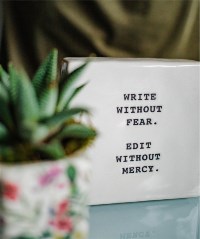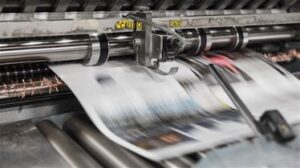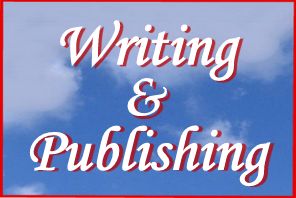<><><>

Photo by Potografierende on Unsplash.
Writing, General
“Use plain, simple language, short words and brief sentences. That is the way to write English--it is the modern way and the best way. Stick to it; don't let fluff and flowers and verbosity creep in. When you catch an adjective, kill it. No, I don't mean utterly, but kill most of them--then the rest will be valuable.” – Mark Twain
TABLE OF CONTENTS
• 15 Interesting Things to Ponder instead of the News. Writing and Word Usage, Tips for Better Health, Stunning Statistics, Time out for Fun, and an Inspirational Story you may have missed.
• A Perfect Formula for Getting Anything Done. This idea from a leading business consultant gave Barbara the motivational push she needed when she knew she had to change directions as a writer to retain her enthusiasm for her work.
• A Costly All Rights/Electronic Rights Issue. An historical case study of a copyright and contract negotiation issue about All Rights vs. electronic rights that Barbara and other professional writers and designers encountered when consumer e-commerce sites began to spring up on the web—an issue that remains problematic in all areas of publishing today. (Includes writer-designer feedback.)
NEW: The Brain Connection between Writing and Remembering. How a message from Dr. David Jeremiah, Turning Point Ministries, put Barbara on a new path of discovery in how to train her mind to remember things she could never remember before.
NEW: Documenting Your Christian Journey. The benefits of journaling about your life experiences, with Barbara’s special journaling tips and short examples from her own Christian journals to inspire you to document your own walk with Christ.
NEW: The Benefits and Power of Journaling. How journaling changed my relationship with my kid sister, based on an idea you might want to try. Plus inspiring articles to help you journal with purpose.
• The Handwriting and Humor of Harry Brabec. Illustrates the importance of preserving copies of the letters and emails you are sending and receiving from family members and friends.
• Here Today, Gone Tomorrow. Nostalgic reflections on the history being lost because of the convenience and speed of electronic and digital communication that have made letters seem impractical.
• The Historical Importance of Family Letters and Journals. Real letters cannot be replaced by cell phone and Skype calls, email and text messages, or Facebook posts.
• One Writer’s Success Story. Barbara’s motivational article on how to succeed in your chosen life endeavor or entrepreneurial venture with nothing more than hard work, self-study, and a willingness to keep going even when the future looks bleak.
• Success Tips for Aspiring Writers and Would-be Authors. How Barbara moved from beginner to professional writer, and the reading and self-study she had to do to achieve success.
NEW: Understanding Copyrights and Public Domain Works. Why thousands of copyrighted works fall into the public domain every year and how this may affect your creative output. If you’re an artist, crafter, designer, illustrator, writer, or publisher, you need to understand copyrights and works now in the public domain.
• Writing as Therapy to Ease Grief and Loss: Moving on from the Painful Loss of a Loved One. It’s not always easy to voice your deepest feelings to another person, but you don't have to be a writer to put them on paper or open your tablet or word processor and let the words pour out.
![]()
“When I was 65 and writing in one of my journals one evening, Harry asked me what I was doing. I said, ‘Just writing in my journal so I’ll have something interesting to read when I get old.’ Without missing a beat, he raised his eyebrows, gave me an amused husbandly look and said, “My dear, you’re already old.” - Barbara
“Fill your paper with the breathings of your heart . . .” - William Wordsworth (1770–1850)

Photo by Kaitlyn Baker on Unsplash.
Writing a Book
“We all have stories to tell and know at least a few people who would like to read them. Some will even by them. But don’t write and self-publish with the sole idea of making money. Write with the idea that the story of your life or family is apt to take on much greater importance after you’re gone, one that will become a great legacy of love . . .” - Barbara, from her memoir, Marcella’s Secret Dreams and Stories: A Mother’s Legacy
TABLE OF CONTENTS
• Barbara’s Book Manuscript Critiquing Service. Wondering if the book you've written is worthy of publication? Will it find a good market if it is professionally edited? A manuscript critique will answer those questions.
• The Book that Changed the Direction of My Writing Life. An example of how taking just one step in a new direction can be life-changing.
NEW: Four Months on a Tank of Gas [PDF]. This revealing glimpse into Barbara’s life as an author tells how her first memoir grew from the gleam of an idea to a self-published book in hand, with insight on the many different hats she had to wear as author, editor, proofreader, book designer, and publisher. It also discusses the challenge of writing a personal memoir to which readers from diverse backgrounds can relate.
• How to Write a Good Memoir: How the book, Your Life as Story, helped Barbara write a better first memoir. Includes tips on structuring content, story timeline, and memory.
“Start writing, no matter what. The water does not flow until the faucet is turned on. – Louis L’Amour (1908–1988)
• Knowing Someone Like a Book. In writing a memoir about her late husband, Harry, Barbara was astounded by some of the things she learned about his life when talking with friends of his she'd never met before.
• Life Writing. What has life taught you that you might write a book about? How the writing of her first memoir changed and enriched Barbara's life; and how writing your life story could change and enrich your life too.
“Whether you know it or not, your desire to write comes from the urge to not just be ‘creative,’ it’s a need (one every human being on earth has) to help others. A well-told story is a gift to the reader/listener/viewer because it teaches them how to confront their own discomforts.” - Shawn Coyne, The Story Grid.
• The Writing of Marcella’s Secret Dreams and Stories. What Barbara learned from researching and writing her second family memoir.
• Success Tips for Aspiring Writers and Would-be Authors. How Barbara got started as a writer, with practical tips and resources for success. Includes lessons in how to succeed in your chosen life endeavor or entrepreneurial venture with nothing more than hard work, self-study, and a willingness to keep going even when the future looks bleak.
![]()
“Good means whatever people buy. Literature is only what people read. That's the important thing. We're in a business. The first page will sell this book; the last page will sell your next one. Because people don't read a book to get to the middle. They read a book to get to the end. And they hope the end justifies the time they spent.” - Mickey Spillane, in an article for Memories magazine, 1990

Photo by Hannah Grace on Unsplash.
Editing and Formatting
“If your first book isn't well written and edited, no one will read your second.” - Robert Frost (1874–1963)
A Brabec Rule: “The better the writing, the lower the editing fee.”
TABLE OF CONTENTS
• Barbara Brabec’s Editing Checklist of Common Writing Errors. There are many things you can do to "clean up" your book manuscript prior to hiring someone to edit it. To save money on your professional copy editing costs, use this helpful checklist to find errors you may have missed.
“I was working on the proof of one of my poems all the morning, and took out a comma. In the afternoon I put it back again.” –Oscar Wilde (1854–1900)
• Book Manuscript Formatting Tips. Avoid digital conversion problems and make your editor and book designer happy by following these proven book manuscript formatting guidelines from Barbara.
NEW: The Fine Art of Being Your Own Editor and Proofreader. If you plan to self-publish your book, you should budget for a good copy editor. If you’re a beginning writer, you may need some content editing too. Any errors you can find by using my tips will save you money when you hire a professional to copy edit your manuscript.
NEW: "Four Months on a Tank of Gas—The Secret Life of a New Memoirist" [PDF]. This revealing glimpse into Barbara’s life as an author features lessons learned during the stages of content editing and rewriting, copy editing and proofreading, typesetting with MS Word, and publishing through LightningSource and Amazon.
NEW: The Move to Change the English Language and How We Write and Speak. Barbara’s rebellious thoughts in protest to this movement, adapted from her 2021 Brabec Bulletin; now expanded to include her first Bulletin on this topic in 2019, with comments from her subscribers on troublesome gender-neutral word changes.
![]()
“If you’ve written and typed all the words, you can't do an effective job of editing or proofreading that writing because your mind knows what you meant to say, and when you read what you've written, your eyes will see only what your mind tells them to see.” - Barbara

Photo by Bank Phrom on Unsplash
Book Publishing
“Publishing is not an easy business to learn. It takes time, an inquisitive mind, and a lot of hard work. A newbie author might have a master’s degree in biochemistry, neuroscience, or sociology, but that doesn’t mean they’re equipped to make intelligent publishing decisions.” - Mark Coker, Smashwords blog, “2020 Publishing Predictions: House of Indie on Fire.”
TABLE OF CONTENTS
• About Common Law Trademarks. Should you trademark your book title? Barbara shares her experience with having the titles of her two best-selling books “lifted” by others, and how the phrase, “Homemade Money,” acquired trademark status and why it may not be used by others for profit.
• Author-Publisher Book-Contract Tips. Barbara's tips on specific clauses you should try to get in a contract with a trade book publisher, and how to find a reputable literary agent. (Part II of “Selling Your Book to a Trade Publisher,” below.)
• Buying a Domain Name for Your Business: A Trademark Pitfall to Avoid. Perspective, tips, and advice from Barbara on a topic of importance to every business owner and author.
• Contracts from Online Book Publishers. Barbara’s Author-Publisher Book Contract consulting service. (Don’t sign one of these contracts until you read this article.)
• The Changing World of Book Publishing. Past and present perspective for today’s book lovers and self-publishers, with discussions about independent book publishers, author-publisher contract changes since 2012, and eBook publishing pros and cons, with links to seven related articles.
“Publishing is a business. Writing may be art, but publishing, when all is said and done, comes down to dollars.” - Nicholas Sparks, one of the world’s most beloved storytellers (22 novels . . . and counting).
• The Controversial “Orphan Works” Copyright Bills and Google Book Settlement. Historical copyright rulings and information about 25 million books Google has scanned that nobody can read yet.
• Online Self-Publishing Companies to Avoid. This article names several self-publishing book companies with bad reputations; also cautions against using vanity publishers.
• Selling Your Book to a Trade Publisher. Anyone can write a book; the trick is to write a book people want to buy. Barbara shares her experiences in working with trade book publishers over the years.
NEW: What Authors Need to Know Before Self Publishing a Book. This introduction to Barbara’s four-part comprehensive guide for self-publishers offers historical perspective and a brief overview of today's publishing climate with the link to her PDF “Crash Course in How to Self-Publish a Book: Author’s Guide to Understanding and Working in the Self-publishing Industry.”
![]()
“I would not sit waiting for some vague tomorrow, nor for something to happen. One could wait a lifetime, and find nothing at the end of the waiting. I would begin here, I would make something happen.” – Louis L'Amour, Sackett's Land (1974)
Articles and Resources for Writers and Self-Publishers
THERE WERE TOO MANY additional resources to include on this particular page, so they were carried to this supplemental page: “Additional Resources for Writers and Self-Publishers.” It offers a lengthy list of the most important organizations for as well as links to recommended articles and websites deemed important to serious writers and would-be self-publishers.
These resources are in addition to those in my “Crash Course in How to Self-Publish a Book” described above.

